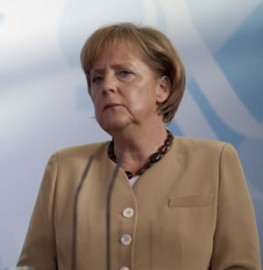
There are two questions being asked here, writes Patrick Mc Nally from Ireland. Are we reaching the endgame of the eurozone crisis and the possible demise of Angela Merkel as chancellor of Germany.
Angela Merkel has had two terms as chancellor of Germany, and at the same time a restive party within the Bundestag. She has also reached that dangerous ten year period when leaders begin to worry about their legacy. What better legacy for her than to secure the euro’s future and to save 50 years of European integration from going into reverse.
How can this be achieved? By a change in foreign policy abandoning the principle that in terms of European integration all 27 member states must move forward together at the same pace or not at all. This means an acceptance of a two speed Europe and the re-linking of political integration with economic integration. The next question is “Does this mean a new treaty or can it be achieved on the basis of enhanced co-operation?”
One thing is certain that the euro post-crisis will be different from the euro pre-crisis and this raises a number of concerns here in Ireland. The first is that Ireland wants to remain a member of the euro as a matter of national interest. The financial market is preparing for a Greek default and fears the losses that this will have for European banks. This fear is reflected in the fall of European bank shares. Ireland will be caught in the backwash of a Greek default. There is a fear that after a forced euro reconstruction, Ireland will be on the wrong side of the equation. From an Irish prospect it will be of particular interest to see if the French president and German chancellor will follow the same prescript as Ireland has had to follow, namely to make their taxpayers assume the burden of bank losses. The assumption is that they will not and instead try to force the European Central Bank to adopt a policy of quantitative easing.
To reduce the possibility of Ireland being caught in a backlash from a Greek default it is being suggested that Ireland should speed up the adjustment process required under the IMF/EU/ECB arrangements to recover economic independence earlier than anticipated. This implies harsher budgets for the next few years than strictly required by those arrangements.
Another factor influencing Ireland’s decision is that in the past Ireland has followed the UK example of using devaluations and inflation to correct an economic imbalance. The unfairness of this policy is that it transfers resources from the poorest to those who hold assets and see their value increase due to price inflation. Those who lose out are savers, those on fixed incomes and workers who cannot keep their wage levels up with the inflation rate. The harder task of improving economic efficiency and productivity was never achieved. It is necessary to tackle the problem directly by wage deflation and reduction in expenditure despite public opposition. There is some evidence that falling wage levels and savings in expenditure are improving productivity and efficiency here in Ireland and will lay the foundation for a more solid economic growth which should allow Ireland to compete more effectively when domestic demand begins to return.
This raises a further question. Can a country on the periphery prosper in a closer economic and monetary union or is it doomed to be the equivalent of the north of England in the UK monetary union. This is another reason to try and solve the productivity problem and may require a cultural change. Can we achieve German efficiency levels or are there cultural factors in terms of lifestyle choices which prevent us reaching German levels of productivity.
There is concern that the Franco-German proposals for reform of the eurozone are based on intergovernmental arrangements rather than on Community institutions. It is only recently that Ireland felt the effects of these two core countries ganging up on Ireland in regard to the corporation tax issue so naturally the preference is for action to be based on Community institutions which are seen as more supportive of small countries.
Lastly, more control at Brussels level highlights the problem which we continue to ignore, namely that of the democratic deficit. Citizens are not convinced by the argument that ministers at European Council meetings are elected by their citizens or by the elected European Parliament. What is required is for groupings in the European Parliament to put forward their policy manifestos and candidates for the presidency of the European Commission and let European citizens decide the direction of policy at the ballot box. Perhaps the concept of a European polity is now finally emerging.
